#manga panel wo context
Text

#my love story with yamada kun at lv999#yamada kun to lv999 no koi wo suru#yamada akito#chibi#kawaii#manga out of context#manga panel#manga shojo
12 notes
·
View notes
Text
Another Point in Favor of Vidow
By this point, many of us in the Four Swords manga fandom are aware of the relationship that is (or maybe isn't) implied between Vio and Shadow. I agree that it is up for some debate, but also my opinion is that the relationship is as clear as it can get, operating within the bounds of its context—that is, early-2000s Japan, kids' manga, the bias against gay couples.
This is just another pin on the conspiracy board of red lines!
The moon is present in three main places during the Vio/Shadow arc—very first (and most damning) when the two meet one-on-one, once in a panel showing the Fire Temple that the two are hanging out in, and once behind the two as they ride on the dragon to cause chaos. (Many thanks to @hauntinghyrule for helping me find those!)
There is a common belief in Japan that the author Natsume Souseki once told a student that their translation was wrong. They'd translated "I love you" as "kimi o aisu," and he thought it was far too blunt. He was a product of the Meiji era, and preferred the idea that the Japanese language should be more poetic and subtle. He then proposed the idea that instead of "ware kimi wo aisu," one should say "tsuki ga kirei desu ne" instead, which translates to English more as "the moon is beautiful, isn't it?" (You can read more about that, and why the guy might not have actually said it, here!)
You can see where I'm going with this.
Whether or not Souseki actually said it, the phrase is widely understood to be a sideways way of saying "I love you." The moon has a lot of meanings in Japanese culture and language, and I won't say that this is the interpretation, or if our lovely authors meant this at all, but they might have. They seem fond of hinting at it. ("We feel blessed that the characters' feelings came across so clearly.")
If we can read into the presence of the moon as presence of romantic possibility, what happens then? Well. A lot.
When Shadow first approaches Vio, he's seen hanging out on top of a pine tree with the moon bright and full behind him.

This isn't the actual manga panel, I don't have that right now, but this art was based on that specific scene, and you may recognize it. There are a few other panels this scene that Vidow shippers like to call out—Vio's apparent blush when Shadow casually moves his sword away (a power move regardless of intent that made me fall in love with him), or the way Shadow hangs on Vio when persuading him to turn to the dark side. If we can read the moon's presence as a hint towards romance, then it's pretty clear what's being implied here—there's an element of seduction.
The second place we see the moon is just after Vio and Shadow's heart-to-heart on the balcony, one of the only canon interactions between them during this period without a lot of plot happening. Here's the panel I mean:

Like hauntinghyrule pointed out, if the moon is visible here, it was likely present during that conversation. That feels like reaching, but I think it's pretty significant that we can see the moon in this panel, too. It's here for that bonding moment. It's part of establishing the tone and setting. If the moon is inherently romantic, then so is this scene.
And then the third panel that the moon is seen in is this one, Vio and Shadow flying on a dragon to bring chaos and fire:
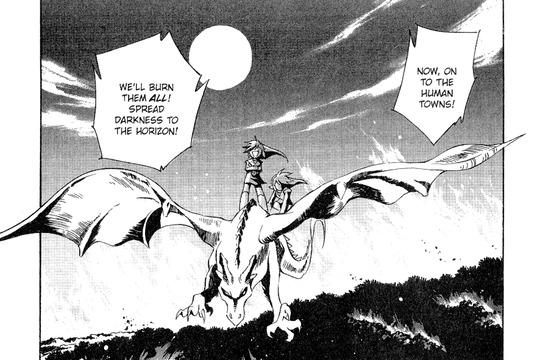
If the moon means romance, then this is a date. They've had their moment, they're in love, all is going well.
It might not mean that much. I could be veering into atla-levels of overanalyzation, for sure! However, this feels like something that could definitely be intentional. "月が綺麗ですね" is understood to sort-of kind-of mean "I love you," turning the moon into a symbol of implied love.
And...it's very thematic, even if it isn't intended. Come on. The moon, hinting toward unspoken romance in some of the scenes where Vio and Shadow's dynamic is at its most stable? Dramatic. Amazing.
...You could read even more into it, and say that Vio is Shadow's moon—reflected light of the Hero or the Princess, guiding him to see the good, a desirable light in the darkness that Shadow insists he has to stay in. There's something lovely about that interpretation, too. :)
#four swords#vidow#um. anyway#my friend likes the ship and got a degree in asian studies#which is where i became aware of this#i think its fun#i speak from the coffin#discourse#???#metatextual wankery#i guess
194 notes
·
View notes
Text
Wow, okay, I’ve seen a bit of the translation drama now, and I regret to say a lot of people who very clearly do not know how to speak Japanese are being extremely polarizing about some perfectly acceptable word choices in the official manga. This is precisely the sort of stuff I hoped to help minimize when I started doing my translations. It’s been a while since I had to put out a warning like this, so I’ll do it now.
Be careful about getting too married to a particular word choice in English. A lot of word choices are very much up to a translator’s discretion. Language is fluid, and Japanese lends itself particularly well to puns and wordplay.
For example (and this is a particularly good example to explain my point), let’s talk about this panel:
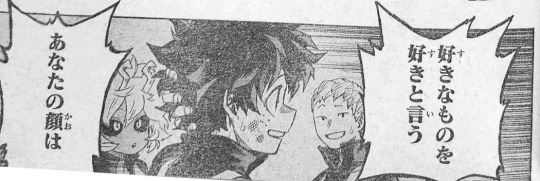
Re: this post
Which leads into what seems to be the crux of the matter: Toga's "love." I've noted in passing before that having her use the word "suki" to describe this love is very curious. It's just an adjective that means something is the object of your affection. It's not a specific word for love like the nouns "ai (love, but broadly)" or "koi (romantic love)" are. "Suki" is just as often translated as "like" as it is "love."
In the above panel, we have the phrase “suki na mono wo suki to iu” (which I translated as “you tell those you like that you like them.”) The word “suki” is being used as an adjective to modify “mono.” However, there is an interesting nuance that is impossible for me to convey in an English translation!
The word “mono” can mean both “(tangible) thing” and “person.” Usually we can tell the difference based on context and the use of the correct kanji. BUT THERE IS NO KANJI USED IN THE ABOVE PANEL. The effect is that what this “mono” refers to is ambiguous. Is it the “things Toga likes” or the “people Toga likes”? It’s not clear: which means that both readings are correct! In fact, the word is probably meant to include BOTH meanings. “All things or people Toga likes.”
And the reason I can’t properly translate that into English is because I have no word that refers to such a thing. In English, it’s a question of “what Toga likes” vs “whom Toga likes,” but in Japanese BOTH meanings are captured by just one phrase.
The most accurate and extremely awkward translation in English would just be “You say who and what you like.” It’s not really something a person would say naturally, especially depending on the context of the conversation surrounding the phrase.
Additionally, “suki” is a very vague word that can be translated in many ways. It gets translated into English as various words all the time. I just decided to go with “like,” but “love” or “dear” would be just as viable. Like I said, it’s kind of up to the translator’s discretion. (And think about the corollary in English. “Like” may not usually mean “love,” but if you were in high school and told someone, especially of the opposite sex, “I like you,” “like” suddenly takes on a whole new meaning.)
Anyways, the whole point of this is that I just want to caution people against jumping to conclusions about these things, especially as you encounter disagreements about such things by fans in the wild. It may be true that a translator has a particular agenda they’re trying to push that runs counter to the message of a story, but it may also be a much more honest and correct translation than you expect. And if you ever need it, I’m always happy to give my perspective on a specific translation to point out the more charitable and non-charitable interpretations, the potential ambiguities, the nitty-gritty grammar issues, etc. (to the best of my ability, of course--I am not a final arbiter on these things either, just another learner myself).
#my hero academia manga spoilers#final showdown spoilers#linguistics fun#i hope i conveyed my feelings well on this#i just think these situations and ambiguities are more fun to discuss#before people become emotionally hung up on a particular word choice#though i don't fault anyone for being passionate about a particular interpretation#this is just the kind of stuff that butters my toast#but it feels a little sour when the drama has already run out of control
87 notes
·
View notes
Text

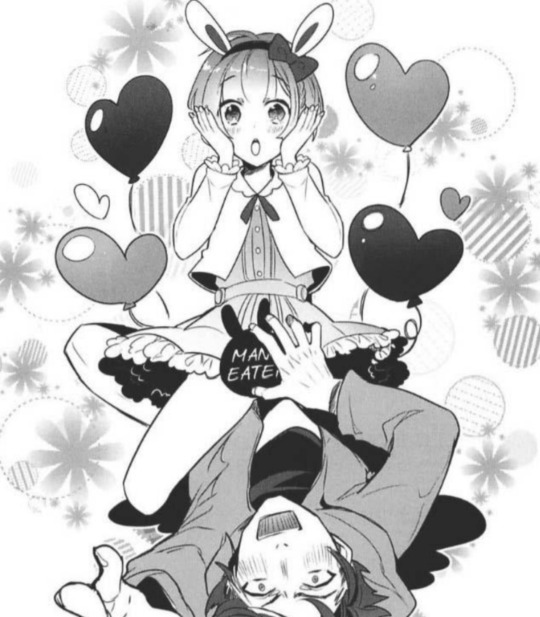
7 notes
·
View notes
Note
I loved reading your take on chapter 126 and Levihan. It brought back so many emotions. Thank you so much for that ❤️
I'd love to read your take on chapter 132 as well. You really made me curious with this:
"What we are not shed any light on here, is how Levi would have answered her question. But I do believe we get an answer for that in 132, when he literally dedicates his heart to her."
Wow thanks so much Anon! I’m really glad my interpretation of it resonated with you 😊
Omg 132 - so I would love to give my take on it, although I’m not sure I’ll be able to highlight anything that hasn’t already been said by some of the amazing Levihan meta writers and blogs already out there. Specifically, let me shout out @nocturnalmk and her masterlist here because some of this content is what got me thinking about 126 in the first place. Her own stuff and links to others regarding 132 are definitely worth checking out! Particularly, the information about Hange’s ‘unrequited love for Titans,’ and how Levi phrases this, is essential.
Also - this all ended up reaching a little past 132 and into later chapters too - hope that’s okay!
So I’m not sure if, after thinking about it more thoroughly and doing a little more reading, the way I phrased it previously is really correct - the idea that Levi dedicates his heart to her. It’s actually kinda more painful, in my eyes.
Disclaimer - here on out is my interpretation of events - everyone will see things differently and so I am no way claiming this is the only or correct way to look at these scenes. Anyway, on with my rambling then -
Let me explain firstly about the scouts’ salute and what it means.
It’s both the action and the words which give ‘shinzō wo sasageyo’ it’s meaning. Translated literally, shinzō is the heart, and wo sasageyo is to dedicate. As to who’s - yours, mine, his, hers - this is inferred from the context of the words. It’s abstract, mainly - more concerned with the action than the owner of the action. At least this is as much as my rudimentary Japanese tells me.
Another thing to note is that ‘shinzō’ is the word used for the physical organ, whereas ‘Kokoro’ is the heart when we talk about it in an emotional or spiritual sense. In light of this, when soldiers salute, it’s not the fortitude of their minds and the spiritual soul that they’re dedicating to the military, it is their literal hearts.
Think about that for a moment.
They are pledging their hearts - the organ that is responsible for keeping them living and breathing - to the military’s cause. In essence, they are pledging to lay down their lives for the cause. If they have to die - if they have to literally hand over their beating heart to whatever fate awaits them - they will do so.
The thud of the curled fist over the heart cements the promise - almost like one is literally saying - yes, here it is, in my chest, and I am giving up ownership of it. It’s no longer mine. My life is no longer my own - it belongs to duty and to the military, even if in the end I have to give it up.
So then let’s take a look at how the final salute between Levi and Hange goes:

(The fact that he calls her four eyes again here will always end me.)
I find these and the following panels especially heartbreaking, not simply because of Levihan’s goodbye, but because of the complex weight this moment holds for both of them, in terms of the ownership they have over their own lives, and the choices they are and are not able to make. It ties into the whole theme of freedom that runs through the heart of the manga.
In Hange’s final moments, it’s never been more apparent how far from freedom both of these characters are. They are not free, because they pledged their beating hearts to a cause, and now one of them must pay up.
Hange realises this. Like in the forest, she’s already made her decision when Levi speaks to her, because she’s true to her duty and she knows that it’s time to give up what she’s always promised she would when the time comes. But she’s terrified, still. Of course she is. This is why she can’t look at Levi. This is why she’s sweating profusely. This is why she tells him to just let her go.
It’s not the titans or death that she’s terrified of, though. How many times have we seen Hange face off with death? How many times have we seen her charge headfirst into hordes of titans without fear or care? Too many times to count.
But now she’s scared. Because something has changed.
No, it’s not death she fears. It’s her own ability to keep her promise - to dedicate her heart and body and life to the Survey Corps if Levi stands before her, looks her square in the eye, and asks her not to.
Hange is scared that Levi is the one thing that will crumble her resolve.
Why?
Because Hange heard Levi’s answer to her private, selfish wish from the forest earlier in the chapter. When Levi, in his typical direct and yet not direct at all fashion, insinuated that while her love for Titans may go unrequited, there are other loves in her life which will not.
Like her love for him.
That is how I interpret that earlier moment - as I said before, the links above are essential reading - and when you look at the moment of their goodbye in light of that, it cuts so deeply.

This is the face of a man warring with his own resolve, just as Hange’s is so close to cracking before his very eyes.
Levi’s expression goes from defiant, to defeated, to devastated. Realisation sets in that they were never free at all, and as people with integrity, neither of them could ever abandon the duty that they’ve pledged their lives to.
Even for each other.
So instead of pleading with her not to go like he clearly wants to from that pained expression, and the fact that he followed her even though she couldn’t bear to face him, Levi instead gives his blessing.

He presses his fist to Hange’s chest because he knows that it really has come time for her to ‘devote her heart,’ to put her money where her mouth is and give up her life for the continuity of the Survey Corps.
The hardest hitting part of these panels is not the way he puts his fist to her chest - not the idea that this is some ‘secret romantic gesture’. Because it’s really not. It’s devastating. What we should really be focusing on is how hard it clearly is for Levi to bring himself to do that - look at how pained he is. What it takes for him to make himself repeat that promise that now chains Hange to her fate - to her imminent death - and leads her living, breathing body away from his.
He doesn’t bring his fist to his own chest because it is not his heart - his body, or his life - that is going to be given up. It’s hers. And he wants to fully acknowledge that. What duty is costing him. Why he really does need to fight on and make what she devoted worthwhile. Sound familiar?
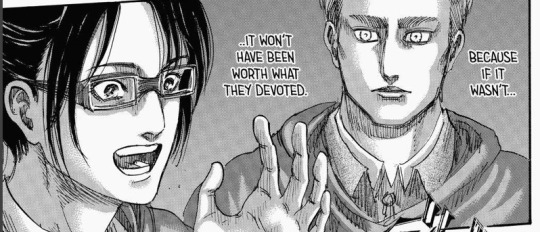
He probably could feel her heartbeat against his hand - a reassurance that in that moment, she was still alive and well in front of him, very physically present. Her whole life still ahead of her, with possibilities and opportunities and choices and freedom. But she gave all that up. She volunteered it readily, and even though Levi could have stopped her, he never would have. Because that’s just not who they were.
As is fitting, the final member of the Survey Corps to sacrifice themselves, and the last salute by Levi, prove to be the things that best encapsulate the idea of ‘shinzō wo sasageyo,’ and the true weight of that promise.

She didn’t want to go. He didn’t want to let her. And although the other characters look neutral or with small smiles, Hange looks filled with longing and pain. Notice how Levi never once says any of it was worth the sacrifice.

Levi is the only one in the end freed from his duty - the sole beating heart left out of so many, as symbolised by his final salute. The single tear is telling of what it cost him to get there.
52 notes
·
View notes
Text
Funimation Con - Adventures in Translation with Industry Expert
11:30 AM - 12:30 AM (PDT) | Room 1 | Friday 3 July 2020
Panel Description: Ever wonder what it takes to translate anime? There’s a lot more to it than you’d think! Listen to a vivid experiential recollection of translating Japanese anime into English from one of the leading authorities in the field.
Host: Sarah Lindholm (Translator Funimation)
Usual questions: How does the process start? What does translation at Funimation look like?
First things first, it helps the translator to know the story in advance. If you can, type out the solution to the mystery or give a full summary it helps the translators get a feel for how they frame the translation. So before simulcasting an anime, our team talks to the Japanese team that worked on the anime or manga and sends the manga to the translator to start analyzing the text and get the story right before we start re-scripting an anime to English.
Things we’re looking for as we re-script/translate to English (or any other langauge):
Jokes, puns, wordplay
Cultural references (original culture)
Cultural references (referred culture) < ex. Animes set in france with french puns for the audience
Non-verbal cues)
Wordplay is the Devil’s Work:
Case Example: Black Butler
Where do we start? First, look at background and setting:
Where is it set? Set in Victorian England, 1888
Who are the main characters: Sebastian, a demon serving in the role of butler. Ciel, his young master. Claude, a rival demon butler in season 2. Alois, Claude’s young master.
Second, we look at important or recurring elements. In our case example (Black Butler) we have Sebastian’s catchphrase, “Akumade shitsuji desu kara,” which happens in nearly every episode. It features a double meaning to , ostensibly he’s saying “You see, I am but a mere butler.” But the exact same sentence pronounced or spelled slightly differently would mean “You see, I am a demon and a butler” because “akuma” means demon in Japanese.
Remember that:
Listeners may take the statement differently based on their knowledge that Sebastian’s a demon.
If you don’t know he’s a demon, you will take the line for its actual meaning of him being a “mere butler.” If you know he is a demon, you will enjoy the double meaning of the text.
Specific concepts to therefore be aware of is: demon, butler/servitude
Miscellaneous factor: smugness of the character.
Therefore: “Akumade shitsuji desu kara.”
Literal meaning: You see, I am but a mere butler.
Double meaning: “You see, I am a demon and a butler.”
How would you translate it?
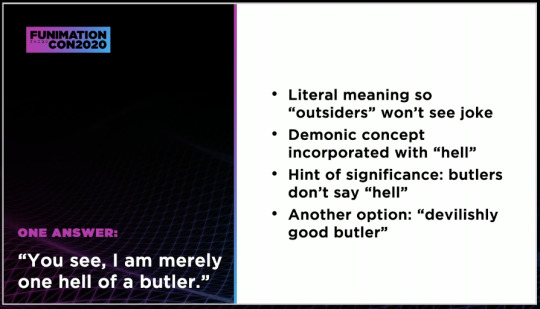
PUN BATTLE! Black Butler II
Claude’s (butler 2) catchphrase is “Danna-sama wo aku made musaboritai.” It is commonly addressed to Alios and it means “I want to gorge myself on you/devour you until I’m overfull.” But you can see it has the same “akumade” sound that Sebastian’s pun did, with “akuma” meaning “demon.”
What do we do about translating? We break out the scratchpad! Different potential translations include:

Non-Verbal Cues:
Case Example: Kase no Stigma
Visual Mismatch:
Result of missing a cue or of translating from the script only.
Typically involves question & answer pairs
Breaks the story
When Up is Down and Right is Wrong
Context: Ren is grieving for a girl he couldn’t save. Ren’s older brother consoles him, “I think she was happy, in her way. [...] you made her into a living person.” Then he asks a question: “Sora ja fuman ka?” Ren shakes his head (the non-verbal cue).
Now “right” is wrong! How? In English culture, shaking your head means “No.” But in the context of the story and Japan’s culture, the shake of the head is not “no” but that you’ve given me some piece.
How do we mediate these right-wrongs? We like to do a watch-through to focus on the bigger picture. The questions we seek to answer are:
(Prewatch) What problems do you see coming up in the season that may need foreshadowing?
Does the video mess with the words you chose? Is there a lot of word play present in the current text?
Did you miss anything?
Is it too fast or to slow?
(We also do a general proofreading of the script!)
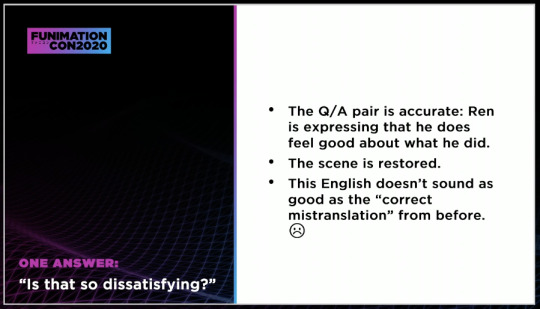
Another note: Idioms don’t translate well so you need to rewrite some lines to give you as similar an experience as possible.
The Final Big Question: “What is Accuracy, really?”
Think of yourself as the characters and think of the experience the creator wanted. Where am I? Japan? France? Outerspace? What are the rules of those areas? How does the creator view the show (potentially)? What’s the genre?
A good tip is to watch a lot of movies and film criticism--it plays into your work a lot! Particularly in fitting the genre.
Another note: Google translation has played no effect in thus far in the profession of translating at Funimation simulcast department of translation. Google’s software still has many flaws in translating, and can’t describe the meaning of the sentence well enough to be useful. It is also particularly poor with idioms.
Terminology:
Case Example: Princess Jellyfish
Background: THE AMA-ZU (the name of the group of geeky girls in Princess Jellyfish.) Ama with this kanji is “nun” and it is Japanese slang for a spinster (someone of marrying age but who’s never gonna to marry). It is also associated with the “b word.”
So, how do we translate this? Our answer: “The sisterhood”
Why?
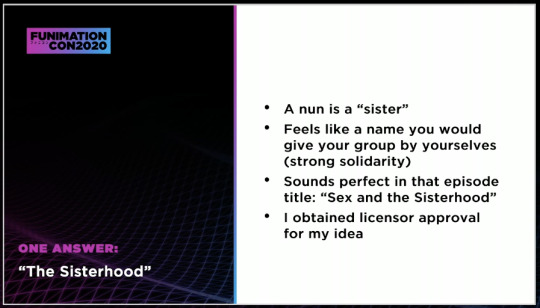
Finally: Some books on translation theory the host recommends: Theories of Translation (https://www.amazon.com/Theories-Translation-Anthology-Essays-Derrida/dp/0226048713/ref=pd_lpo_14_t_0/135-6117623-9673542?_encoding=UTF8&pd_rd_i=0226048713&pd_rd_r=d4b40cd7-4afa-413a-a77e-7dd625a6b90a&pd_rd_w=EIIcM&pd_rd_wg=VWV3n&pf_rd_p=7b36d496-f366-4631-94d3-61b87b52511b&pf_rd_r=4H7KDQDT33GNDC2YGNR6&psc=1&refRID=4H7KDQDT33GNDC2YGNR6) and The Craft of Translation (https://www.amazon.com/Translation-Chicago-Writing-Editing-Publishing/dp/0226048691)
#black butler#kuroshitsuji#Kase no Stigma#princess jellyfish#translation#anime in translation#anime#manga#funimation#funimation con#funimation con 2020#peggyseditorial#notes
22 notes
·
View notes
Note
hey, a little while ago you talked about Sebastian being a "muscle brain"; I was rewatching BoA and thought it slightly strange that UT says something along the lines of "you (Sebastian) have a fair hand for strategy". From watching the fight, I feel like Sebastian doesn't really try to strategise until that point, just using force, yet UT says he has a "fair hand" for it? sidenote: I'm aware that the manga says something different, but similar I think. p.s. I love your blog! it's so cute! ♡ ♡
[Related post]
Dear Anon,
First of all, thank you for your compliments!
Though I am not entirely sure, I assume you are talking about this panel in chapter 61? If not, feel free to send me another ask!
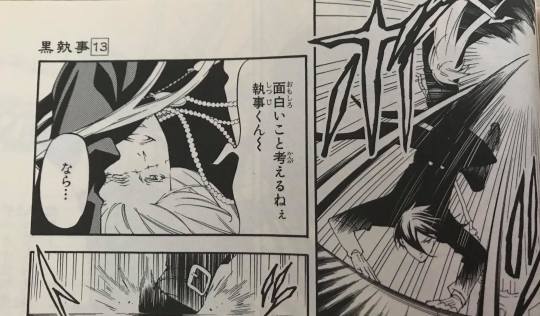
面白いことを考えるねぇ、執事くん〰
Omoshiroi koto wo kangaeru neé, shitsuji-kun〰
You come up with such funny/interesting things, Butler〰
In the original manga, Undertaker says that Sebas came up with interesting/funny [strategies] in order to defeat him, after Sebastian attempted a distraction manoeuvre by throwing a large number of tables.
In Japanese, the word ‘omoshiroi’ is about as ambiguous as its English equivalent ‘interesting’. When somebody says something or someone is ‘interesting’, it is often ambiguous as to whether it is a truthful compliment, or an euphemism for something that is weird, or even ridiculous. Q: “How do you like my pie?” A: “… Erm, it tastes interesting.”
In the context of their brawl, it is most probable that Undertaker meant it in the sense of: “throwing tables at me even though you know my Death Scythe can slice them like biscuits? How ‘interesting/funny’ that you thought that could take me down.”
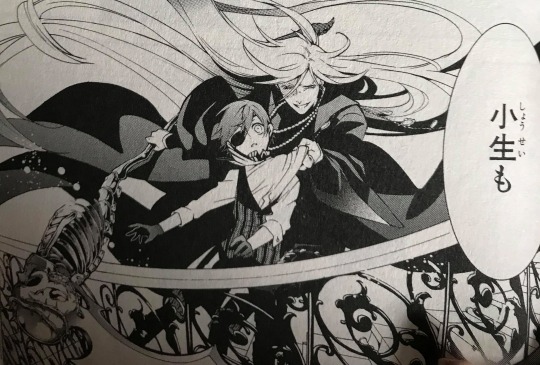
なら… 小生も
Nara… Shousei mo
In that case, I too [shall do something interesting]
I would say that here Undertaker is being very condescending; it is some splendid macho'ing flying around. While ridiculing Sebastian, Undertaker warns the demon against underestimating him any further. Barely a second after he has spoken the words, Undertaker already seizes his hostage, and drives Sebas into a dangerous position. “You thought you were interesting? I will show you what real interesting is.”
You are of course right, Anon, I did not get the feeling Sebas was actively strategising until that point either.But it makes sense considering how he is indeed muscle brain, and like I explained in this post, it is only reasonable that he is because he could afford to not strategise, until he ran into an opponent of Undertaker’s calibre.
Likewise explained in this post, Sebas has now learned that brute force won’t work on Undertaker. Instead of Muscle Brain™, he will have to become Muscular Strategy Brain™, and fast! Sebas might need some time to come up with a really good strategy, but Undertaker is probably aware of this; it is hard to believe that if Undertaker has any say in the matter, he would help his opponent defeat himself by giving someone with such brute strength more time.
I don’t know how Sebas intends to apply his strategies in future, but I am excited to see how Undertaker could be neutralised. I have high hopes for the showdown being highly satisfying. I trust that in the future if Undertaker would repeat the compliment “you come up with such interesting things”, then it would be truly meant.
#Kuroshitsuji#Black Butler#Sebastian Michaelis#Muscle Brain#Muscular Strategy Brain#Undertaker#Battle#Campania Arc#Japanese#Language#Translation#Analysis#Subtext#Most glorious macho'ing
69 notes
·
View notes
Text
okay who wants more bnha translation
the sources i’ve found this time suck!!! i can’t read them all that well!!! actually, no!!! i’ve found them at @trashformha again!!! someone else has probably already translated these, but i’m not doing this for anyone but myself and my own advancement as a person!!!!!!!!!
bnha chapter 277: who’s that? or, in other words, 1-a’s worst-case scenario is finally revealed!!!

this one is. so easy
izuku: endeavor!
endeavor: what about shouto?
izuku: it’s just us two!!
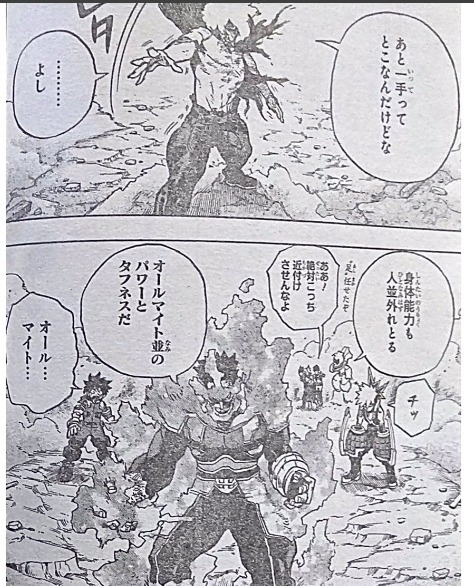
...okay this one is not easy
bubble 1: ato ittette to konnandake do na
(bubble 2: yoshi. this is just, like, “okay. fine. let’s go”)
“ato” i have. no clue about. “itte” with this kanji is literally “one hand,” or “single-handedly, in one go.” the second “tte” needs context, but it’s generally a suffix that indicates a quotation, or “in regards to”
“konnan” followed by “dake,” i think, is just “something like this,” with the “this” in question being kind of. inconsequential? unless it’s actually “dakedo,” in which case, it’s more like “however”
his hand’s regenerating, so i think he’s saying, “i guess i can take you out single-handedly. ...let’s go”
bubble 3: shindai nouryoku mo hitonami hazuretoru
“shindai,” body, physicality. uses the kanji for “body.” “nouryoku,” ability. uses the kanji for “power.” i suppose it’s just “physical power.” “hitonami,” “ordinary person,” and that’s kind of confusing, i guess?
“toru” doesn’t seem to be a regular way of ending words, but gran torino uses it. i think it’s just his dialect adding a “to” with “-ru” verbs? so “hazureru” would be, like, “removed,” but it can also be “contrary,” and i don’t know???
it could be, like, “his/their physical power is far away from normal people’s,” or it could be something about izuku and kacchan being contrary little shits
bubble 4: aa! gu(???) kocchi (???) sasendayo
is it obvious that i can’t even read this? “kocchi” is “this way,” and “sasendayo” is “to not allow,” like, if you were punching out a villain from the sky when they were threatening to kill someone, you’d be, like, “sasendayo!” “i won’t let you do this!”
“you can’t stop them from coming here to help,” or something. also, i can’t read the bit outside the bubbe
bubble 5: ALL MIGHT nami no POWER to TOUGHNESS da
“nami” is the same kanji used in “hitonami,” and it means “ordinary, average.”
“this is all might’s average power and toughness”
and kacchan and izuku’s bubbles don’t need translating. so!
shigaraki: i guess i could take you all out single-handedly. ...alright, let’s go.”
gran torino: they’ve gone past the usual limits of their physical power
one of the heroes (aizawa?): and you can’t stop them from coming here
kacchan: (noise of exertion)
endeavor: this is like all might’s normal power and toughness
izuku: all... might...

floaty text 1: midoriya izuku
floaty text 2: omae no “chikara” jya HERO niwa nare nai yo
i think this is a flashback of him saying “with your power, you can’t be a hero,” because i think izuku’s using black whip like aizawa’s capture weapon?
bubble 1: midoriya
bubble 2: gou(?)teki ni ikouze!
the “gou” uses the kanji for “join, together,” and the “teki” is “like,” so it’s something along the lines of “we’re doing this like a team!”
floaty text 2: AP MACHINE GUN

bubble 1: mt. lady!
bubble 2: iwarenakutemo
“nakute mo” is “even without,” and “iwareru” is “to be told” so she’s saying, “even without instruction”
bubble 3: ikasemasenyo
“ikaseru” is the causative of “iku,” or “to go.” the “masen” makes it negative. so, “i won’t let you go”
“even without being told, i’m not going to let you past!”
floaty text next to the chapter end marker: kyoku ga butsugaru daigekisen!!
big bodies clash in the rage battle!!
well, that’s a bit literal, but still!!!!!!

this is one of the ones that i found at the illegible source, but it’s still kind of clear!!! let’s go through the panels in the way we’d read them if they were actual manga pages, even though they’re all out-of-order anyway!!!
page 1
bubble 1: uwa-
yep, that’s just a noise.
bubble 2: gomen
yep, that’s just “sorry”
bubble 3: mou kimi ni kyoumi nainda wa
“oh, i didn’t realise you’d be interested”
page 2
bubble 1: dakara damatterou yo
“so shut up”
bubble 2: yo
yo
page 3 (the first page)
chapter title: dare da yo
“who are you; who is it”
floaty text: shigaraki vs de
page 4: ore no mono ni nare
“it will become mine”
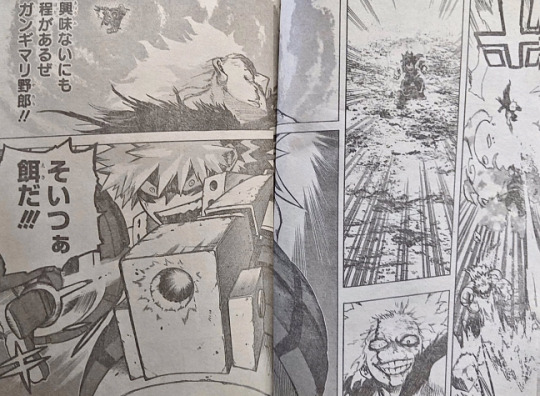
floaty text: kyoumi nai nimi hodo ga aru ze GANGIMARI yarou!!
“i’m not interested in how far you reach, either,” or something along those lines, but i don’t care BECAUSE the thing that’s confusing to me is “gangimari.” all i got from a google search was weird japanese memes, and i’m not taking safesearch off. i think it has something to do with drugs??? i’d be delighted if kacchan called shigaraki “you fucking junkie” or something, because. it’s kind of out there for a kids/teen story. though, this is bakugou “choke on the shit you’re talking and die” katsuki
bubble: soitsu(a) esa da!!!
“that guy’s bait!!!” and, kacchan, are you fucking kidding me? YOU DON’T SAY THE PLAN IN THE MIDDLE OF ENACTING IT

len: please i want some legible words
my un-legal source: you want easy words? you want easy words for babies? you want to be able to read the easy baby words???
endeavor’s floaty text: ore dake no chikara de wa (?)te nakutemo
“even if my power alone can’t (something??? I Can’t Read)”
all might’s floaty text: watashi no mezameta (??) wo kimi mo nazoru koto wa nai
“i woke up” and then there’s these two kanji which are basically illegible for me followed by a particle, but then there’s “there’s no need for your to copy me, either”
endeavor doing a big punch: BURNING FIST!!

i saved the best for last!!!!!! i don’t care about endeavor, and shigaraki just makes me sad, but i Live for the “academia” part of “boku no hero academia” and look!!! there’s a little classroom scene!!!
floaty text 1: noumu noseide HEROtachi ga atsumarenai!
“because of the noumu, the heroes can’t gather together!”
floaty text 2: shigaraki e no senryoku ga tarinakunaru!!
“we won’t be enough against shigaraki’s fighting power!!”
floaty text 3: “masshou” ga tokarete mata houkai wo okosaretara...!!
“erasure” can stop it, but then, the disintegration starts again...!!”
bubble 1&2: “saiaku” wa sensei wo ushinau koto!
“the worst case is sensei losing this!”
bubble 3&4: zutto! mamotte kite kureta sensei wo ushinau koto desu!!
“always! it’s sensei, who protects and provides for us, losing this!!”
0 notes
Text

#my love story with yamada kun at lv999#yamada kun to lv999 no koi wo suru#yamada x akane#yamada akito#kinoshita akane#runa sasaki#manga out of context#manga panel#manga shojo
9 notes
·
View notes
Text
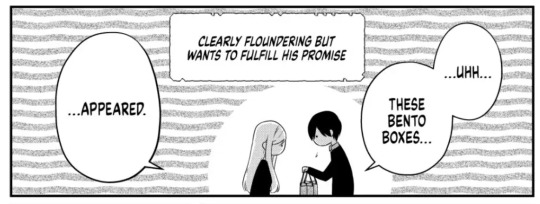
#my love story with yamada kun at lv999#yamada kun to lv999 no koi wo suru#yamada akito#kinoshita akane#yamada x akane#manga shojo#manga out of context#manga panel
10 notes
·
View notes
Text
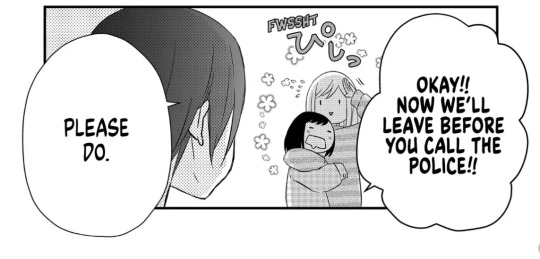
#my love story with yamada kun at lv999#yamada kun to lv999 no koi wo suru#yamada akito#kinoshita akane#manga out of context#manga panel#manga shojo
9 notes
·
View notes
Text
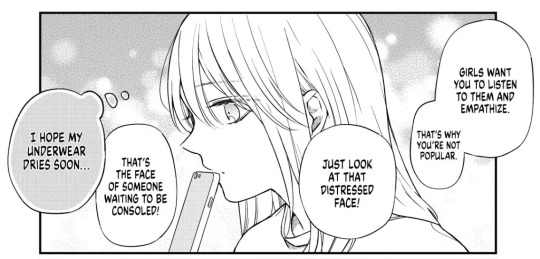
#my love story with yamada kun at lv999#yamada kun to lv999 no koi wo suru#kinoshita akane#manga shojo#manga out of context#manga panel#the deep thoughts of a girl#shes just a girl
6 notes
·
View notes
Text

#busu ni hanataba wo#a bouquet for an ugly girl#manga shojo#manga panel#manga out of context#how to be the third wheel
1 note
·
View note
Text
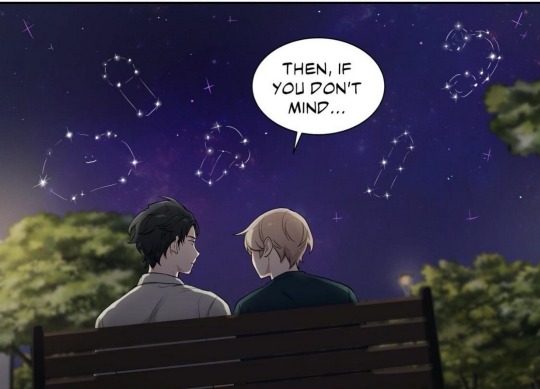
#hangul#hangul without context#ooc webtoon#manga oc#manga panel wo context#ooc manga#manga out of context#manga panel
4 notes
·
View notes
Text

2 notes
·
View notes
